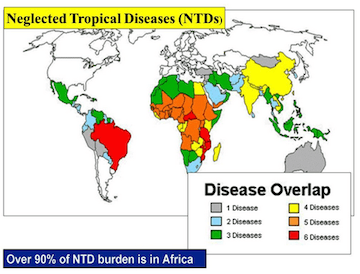Health Ministry collaborate with Spanish organization to eliminate NTDs
 A joint project agreement has been signed between the Ministry of Health (MOH), Ghana Health Service (GHS) and Anesvad Foundation, a Spanish Organisation, for the Control, Elimination and Eradication of Skin Related Tropical Diseases.
A joint project agreement has been signed between the Ministry of Health (MOH), Ghana Health Service (GHS) and Anesvad Foundation, a Spanish Organisation, for the Control, Elimination and Eradication of Skin Related Tropical Diseases.
The 5.8 million euros starter project, would however focus on Buruli Ulcer, Leprosy and Yaws, which were still endemic in some seven communities across the country, and further complement existing government efforts and strategies, in areas including advocacy, case management, and improved knowledge of the disease.
Dr Anthony Nsiah-Asare, the Director-General of the Ghana Health Service (GHS), in an address at the signing of the project agreement and launch in Accra, said government would continue to mobilise and harness efforts to mitigate the negative impact of Neglected Tropical Diseases (NTDs), which affected especially the poor of the poorest in deprived communities.
This, he said, would bring smiles to the faces of the affected, reduce the associated morbidities, disabilities and deaths that usually accompanied these illnesses, and further eliminate stigmatization as well as the socio-economic impact on both individuals, communities and the nation at large.
Currently, ten of the 17 NTDs globally identified were endemic in Ghana, consequently these illnesses, including skin-related ones like leprosy, Buruli Ulcer and Yaws, had become a major public health disease burden for the country, he said.
The NTDs he explained, were usually diverse groups of tropical infections, especially common in low-income populations in developing regions of Africa, Asia, and the Americas, and were caused by a variety of pathogens such as viruses, bacteria, protozoa and helminthes.
Dr Nsiah-Asare, said government, through the GHS, has resolved to closely engage with key partners, including non-governmental organisations and communities, to ensure early detection, reporting, and treatment to prevent complications, reduce the socio-economic impact and stigmatization of sufferers of these illnesses.
The Director-General said it was shameful and unacceptable for the country to be still battling with such debilitating and preventable diseases, several years after the establishment of the NTD Programme, under the joint watch of the MOH and GHS, to pay the needed attention to the high disease burden.
According to him a lot of progress seem to have been made over the years, through interventions and strategies such as Mass Drug Administration, Innovative and intensive disease management strategies, such as research, to address these high burden diseases, which had yielded progress in the prevention, early detection and control of some NTDs, like guinea worm infestation.
Dr Nsiah-Asare said notwithstanding the progress made so far, there were still major challenges, as further research has revealed that there were more numbers, which meant that the seemingly decline was due to low case search and notification.
He thanked Anesvad and all the other partners for collaborating with the GHS to ensure the control of buruli ulcer, sustain the elimination of leprosy and eradication of Yaws.
He also pledged the Ministry’s commitment towards the adherence of the principles enshrined in the agreement; and safeguard the investment imputed to reduce waste, ensure transparency, flexibility, and teamwork for maximum outcomes.
Ms Sara Pena, the Project Director for Anesvad Foundation called for transparency in the mobilization of funding, teamwork, positive attitudes and the need to pursue an integrated approach towards the achievement of the set goals.
Dr Benedict Okoe Quao, a Family Medicine Specialist and Acting Deputy Project Manager, Buruli Uncer Programme, said the goal of the Project is to ensure an overall quality health care for Ghanaians, saying that, there were effective drugs available for early treatment only if cases were detected early.
He advised the public to seek early treatment and also help identify persons with strange skin infections and rashes in their communities and refer them to the nearest health facilities for treatment.
Source: GNA
The post Health Ministry collaborate with Spanish organization to eliminate NTDs appeared first on Ghana Business News.
from Ghana Business News http://ift.tt/2rUleqg
via IFTTT
Comments
Post a Comment